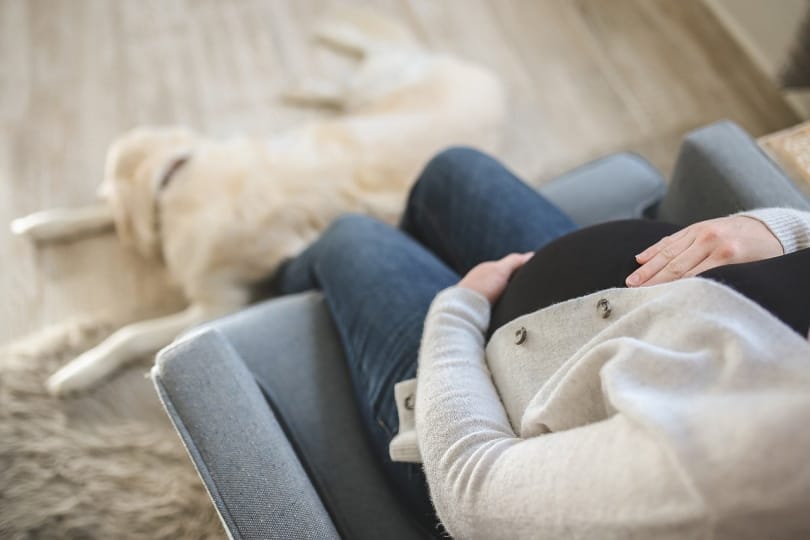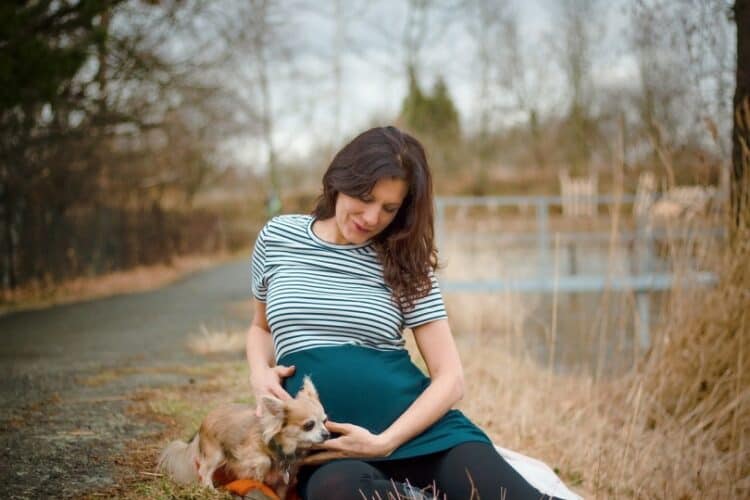If you’re a dog owner who is expecting a baby, you’re probably busy planning the adorable photo shoots you plan to take. You might also wonder how your dog will react to your pregnancy and their new sibling. For example, do dogs get clingy when you’re pregnant?
It is common for dogs to display behavioral changes during your pregnancy, including becoming clingy. However, they may not understand that you are pregnant, just that something is different in their lives. In this article, we’ll discuss why your dog’s behavior may change when you’re pregnant, whether dogs can sense labor, and how to prepare your pup for the arrival of the new baby.
Why Your Dog’s Behavior Changes During Your Pregnancy
Many things change with your body and your daily routine during pregnancy. Our dogs are sensitive and observant animals. Their senses of smell and hearing are far more acute than ours, and they can accurately sense our moods.
While there has been no conclusive proof of this, doctors and scientists speculate that dogs can smell the changes that occur in a pregnant person’s body, such as increased hormones. They may even be able to hear a heartbeat from your belly later on in the pregnancy. Dogs will likely notice other physical changes as well, such as the size of your stomach and how your gait is altered as it grows.
Pregnancy also brings with it many changes to both you and your dog’s daily routine. Maybe your sleep patterns are disrupted, and you can’t tolerate your dog sleeping on the bed like you used to. Morning sickness is another change, along with extra visitors, unfamiliar baby gear, and possible renovations to the new baby’s room.
All of these changes can impact your dog’s behavior. Some dogs will become clingy or extra protective, while others could act out in other ways, such as becoming destructive. However, some dogs may not react at all; it just depends on the individual pup.

Can Dogs Sense Labor?
Anecdotally, some pregnant dog owners claim that their pups become extra clingy or protective right before they go into labor. Again, this is another situation where scientists can speculate but have no definite proof.
Impending labor causes hormone changes and other signs that could alter your scent and signal your dog that something is happening. The house’s overall mood may also change with heightened excitement, nervousness, or stress. This atmosphere could also cause your dog to react differently, not necessarily because they know you’re going into labor, but because they can tell something significant is happening.
How To Prepare Your Dog for a New Baby
Even if your dog winds up loving your baby, the new arrival will still bring some considerable changes to your pup’s life. To make the transition as easy as possible, begin preparing your dog ahead of time.
Get your dog accustomed to any new routines before the baby arrives. For example, if your dog is used to sleeping in your room but will be evicted when the infant arrives, get them used to their new bed early.
Introduce your dog to the baby gear slowly as well, especially walking with a stroller. Gradually get your dog used to all the strange new equipment, offering plenty of treats along the way.
Decrease the time and attention you give your dog, so they aren’t stressed about the baby suddenly commanding most of your waking hours. Play your dog recordings of a baby crying and other infant sounds, so they get used to hearing them.
Before bringing your new baby home, get your dog used to their scent by bringing home a used blanket. Make sure your dog is calm and under control when it first meets the baby.
Conclusion
Although many members of younger generations, especially millennials, are choosing to delay or skip having kids, plenty of pup parents still plan to add a new baby to the family. Don’t be surprised if your dog’s behavior changes, including becoming more clingy, while you are pregnant. With some planning, patience, and lots of love, your whole family can happily co-exist and film adorable TikToks together after your new baby arrives.
Featured Image Credit: Pixabay














